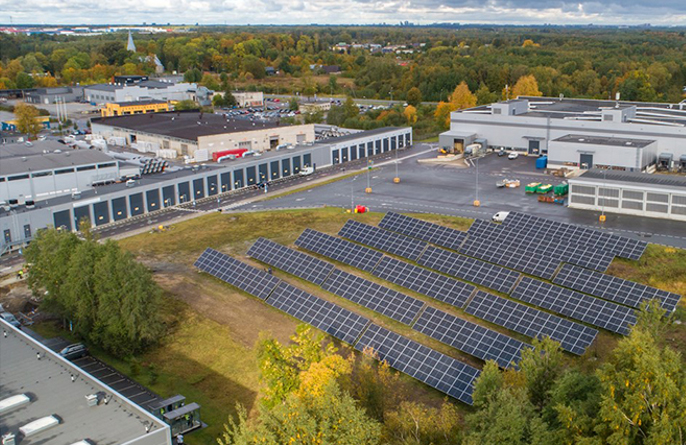Emissions in own operations
Target 2030: Reduce emissions by at least 80 percent and achieve carbon neutrality in our own operations
As part of our drive to make ABB carbon-neutral, we have committed to three initiatives of the Climate Group of global companies. By 2030, we will completely electrify our vehicle fleet (EV100 initiative), source 100 percent of our electricity from renewable energy sources (RE100 initiative), and improve energy efficiency and productivity across our operations (EP100 initiative). These actions will help us to reduce our scope 1 and 2 GHG emissions by at least 80 percent by 2030. We are exploring additional solutions to eliminate the remaining 20 percent, with carbon offsets serving as a last resort.
In 2022, we made considerable progress toward our 2030 goal of carbon neutrality. We reduced our total energy consumption by 15 percent compared to a 2019 baseline. At the end of 2022, 52 percent of our energy was sourced from renewables. Since 2019, we have reduced our GHG emissions by 65 percent. A number of measures we have taken have made these results possible. We have increased the share of certified green and self-generated solar electricity we use from 24 percent to 81 percent. At the same time, we continually improve the energy efficiency of ABB sites by conducting energy audits, implementing energy management and monitoring systems, and making changes to buildings and production processes. Additionally, we remain focused on cutting our SF6 emissions, which we have reduced by 79 percent since 2019.
2022 climate action initiatives
In 2022, we undertook a wide range of actions to reduce ABB’s energy use and emissions.
In keeping with our EP100 commitments, we implemented more than 90 energy-efficiency projects across the company. These projects varied widely, from measures such as installing automatic lights and HVAC temperature controls at our factory in Cheonan, South Korea, to larger projects such as implementing a heat recovery system at our Large Motors and Generators factory in Helsinki. Our energy/distribution components factory in Ede in the Netherlands has saved 215,600 kWh of power per year using smart building management and LED lighting. From next year, the Ede site will reuse the heat generated in the production process, offsetting further carbon emissions.
In addition to these types of initiatives, which are undertaken at the site, division or business area level, the ABB Real Estate function runs a Group-level energy savings program. As of 2022, this program had achieved savings totaling 92.5 GWh per year and $11.6 million between 2018 and 2022. The savings were derived from 336 completed and ongoing energy-saving projects at ABB sites around the world.
In alignment with our RE100 commitments, we continued to source renewable energy for our sites and/or equip them with on-site renewable power generation capabilities. In the past year, we installed on-site solar power at the ABB campus in Aleksandrów Łódzki, Poland, our technology campus in Jüri, Estonia, and the ABB factory in Cheonan, South Korea, among others.
Share of renewable electricity
Figures are adjusted for portfolio changes.
Total energy used and total scope 1 and 2 GHG emissions
Figures are adjusted for portfolio changes.
Our e-mobility research center in Delft in the Netherlands is already carbon neutral and generates 75,000 kWh of power from solar panels and geothermal sources. The site also feeds excess power into the local grid. Thanks to its use of renewable energy, the facility avoided 27,825 kg of GHG emissions over a 12-month period. And at our new innovation and training campus that opened at B&R’s Eggelsberg headquarters in Austria, we installed one of the largest self-consumption photovoltaic systems in the country. Elsewhere, we have continued to contract with renewable energy suppliers to serve our facilities, most notably in the United States, where a large number of sites were shifted to 100 percent green energy in 2022.
In addition, we remained on track to electrify ABB’s fleet of more than 10,000 vehicles by 2030, as per our EV100 commitments. In 2022, 50 percent of our global new vehicle orders were for either EVs or plug-in hybrid vehicles (PHEVs). Among other actions, in Spain and Portugal, ABB Motion chose to accelerate the transition of its fleet to EVs by 2024 (while retaining some hybrids for service uses). It intends to achieve a 90 percent conversion rate by the end of 2023. Lastly, ABB’s E-mobility division has committed to converting its entire fleet to battery-electric vehicles (BEVs) by 2026.
By 2030, our goal is to achieve carbon-neutral operations. By demonstrating our leadership in the field of operational decarbonization, we want to inspire our customers and show them that the energy transition can be achieved now by deploying existing energy-transparency, efficiency, electrification and resiliency solutions that serve communities.
Emissions of sulfur hexafluoride
In addition to the projects described above, we have implemented a global program to reduce our direct emissions of SF6 from losses associated with either handling or production processes. Over the past year, the program reduced ABB’s direct emissions of SF6 by 61 percent. In 2022, we emitted 861 kg of SF6, down from 2.21 metric tons in 2021.
